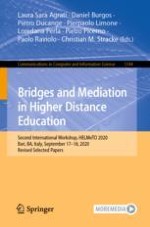2021 | OriginalPaper | Buchkapitel
The Differential Effects of Distance Learning and Presential Classroom Instructions on Performance of Male and Female Students of Science Education in Undergraduate Introductory Biology Course
verfasst von : Ebere Ibe, Joseph Aneke, Joy Abamuche
Erschienen in: Bridges and Mediation in Higher Distance Education
Aktivieren Sie unsere intelligente Suche, um passende Fachinhalte oder Patente zu finden.
Wählen Sie Textabschnitte aus um mit Künstlicher Intelligenz passenden Patente zu finden. powered by
Markieren Sie Textabschnitte, um KI-gestützt weitere passende Inhalte zu finden. powered by
